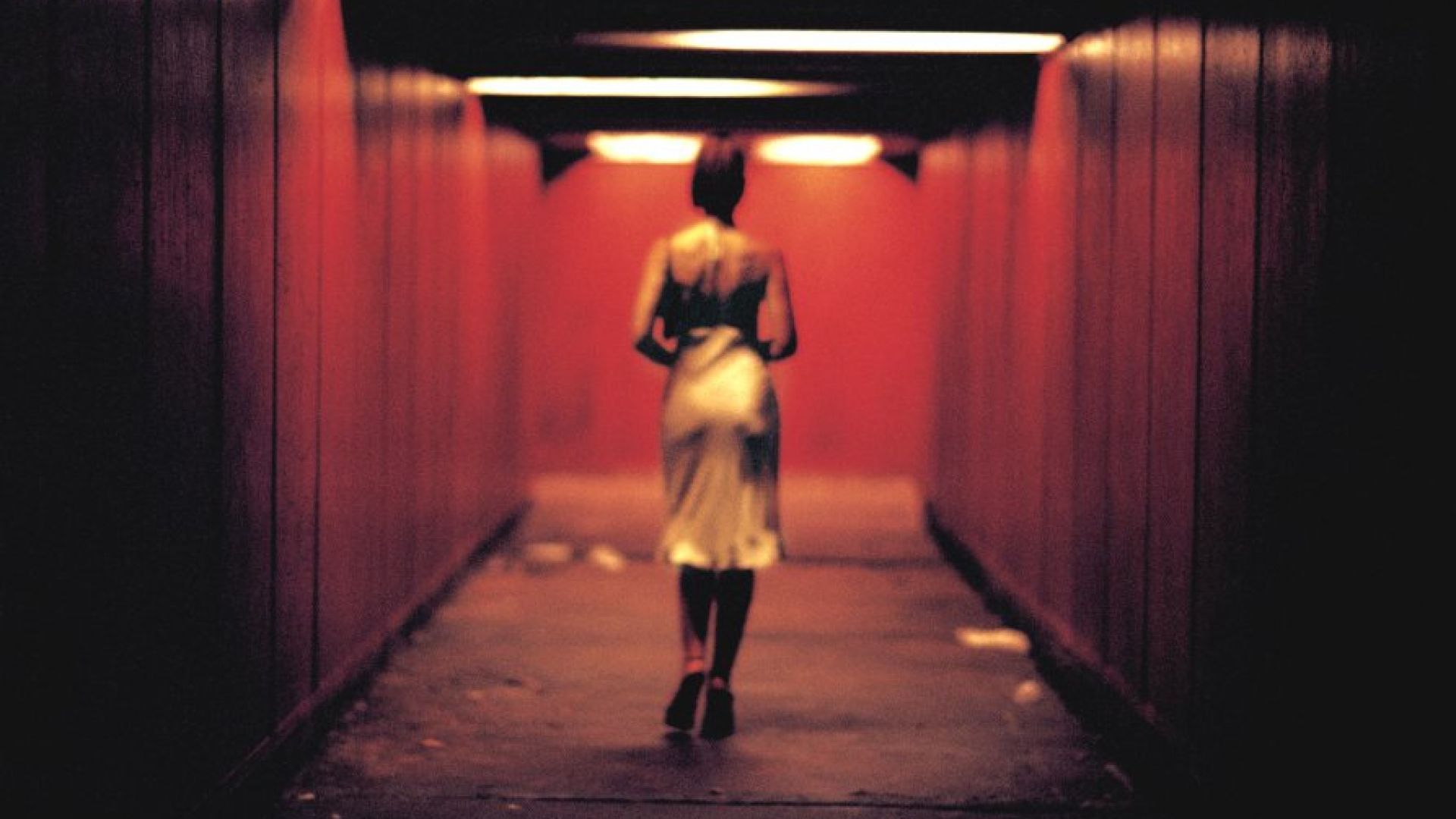 |
| Scene from "Audition" courtesy of andsoitbeginsfilms.com |
 |
| courtesy of chrisandphilpresent.co.uk |
Blue Velvet (1986)
To be totally honest, most David Lynch films should only be seen once. But, of all that I've seen, I would say this is really the only one that I really thought was a wonderful, subversive film, as opposed to a beautiful attempt to screw with your head. With great work from Isabella Rossellini and Kyle Machlauchlin and a mind-blowing performance from Dennis Hopper as psychopath Frank Booth. But, with all the fascinating camerawork and acting, this is a tough one to get through. On top of the horrifying visuals, we get to see some of least sexy and most uncomfortable nude scenes on screen. But, as tough as they are to watch, they feel necessary to the story and to the horror that is Blue Velvet. It will irk you...but you need to watch it.
| courtesy of dvdtimes.co.uk |
The Seventh Continent (1989)
Director Michael Haneke won his second jury prize at the Cannes film festival this year with Amour, but he got his start in the feature film industry with this plotting story of a family's loss of self and their decision to end it. Telling their family and friends they are going on vacation to Australia (the seventh continent...get it?), they slowly begin to destroy everything they own, including a giant fish tank (easily the most difficult scene in the movie). I'm not sure what is worse - the slow burn of watching this seemingly normal family destroy their lives deliberately or the way Haneke handles his camera as they do. It's a brilliant look at what people can brought to when they are stuck in never-ending misery. Sometimes there's nothing worse than being comfortable and stagnant. Haneke has since delivered some other films that would probably make this list, but I haven't seen them yet. I'll let you know when I attack his films in my own attempt at a marathon.
 |
| courtesy of amazonaws.com |
The Sweet Hereafter (1997)
Canadian filmmaker Atom Egoyan walked a difficult line with 1997's The Sweet Hereafter, a based-on-a-true-story about a school bus full of children that ends up in a frozen lake (it got him Oscar nominations for directing and writing). The film focuses on a sleazy lawyer named Mitchell played by Ian Holm as he navigates this small town, looking for an entry point to file a lawsuit against the school, the driver, the city, or whoever, looking for a way to cash in on this tragedy. Just like any ambulance chasing attorney, he has to seem like he's working for these families, making plays to earn their trust. The film is slow - it's unflinching, especially when Mitchell starts to push the townspeople's' buttons and sticks his nose in places it doesn't belong. At the same time, he deals with his own failures as a father. It's dark and depressing, but a truly honest look at small town Canada and how tragedy can bring people together or pull them apart. That being said, it will probably ruin your day. |
| courtesy of coosacreek.org |
Dancer in the Dark (2000)
As with Michael Haneke above, director Lars Von Trier has a number of films that may meet this list's criteria - I just haven't seen them. Dancer in the Dark, Von Trier's stark, Bjork-starring musical, is deliberately nightmarish. Bjork plays an Eastern European woman who travels to America with her son, dreaming of the opportunities with which Hollywood has presented her. Instead, she works at a factory and acts in a local theater group, saving money for an operation for her son that she hopes will prevent what she feels is an unavoidable affliction. Unfortunately, her fantasy life of musical numbers and choreography impedes on her everyday life, causing more harm than good. Von Trier presents the bleakest movie musical imagined - one where the performers are untrained and messy and happiness isn't just a playful tune thrown on top of an everyday life. It's a difficult parable to swallow - the shortcomings of the American dream and the truth behind so many stories of failure we never hear. A film that tears at your soul and an ending that slaps you across the face. |
| courtesy of susu.org |
Irreversible (2002)
Director Gaspar Noe is known as a bit of a shock auteur, finding ways to affect the audience in a sensory manner, as opposed to just the visual. His French story of revenge is told in reverse order through one day in Paris, diving into the underworld of the streets and the brutal truths behind just how far people will go to achieve the vengeance for which they search. In Irreversible, Vincent Cassel plays Marcus, who learns his girlfriend Alex (Monica Bellucci) has been raped and beaten, and joins up with her ex-boyfriend Pierre (Albert Dupontel) to find the man who committed the crime. In essence, it's a mystery/crime thriller. But Noe's camerawork is shaky, his narrative structure is broken, and his visual style is stomach-turning. Between the brutal crime itself (an 11-minute, uninterrupted scene) and Marcus and Albert exacting their revenge (a violent scene involving a fire extinguisher), it almost feels like punishment. But, with all that, it's still an aggressively exciting film, with more twists and turns that you would imagine. If you watch it twice, have your finger on the fast-forward. |
| courtesy of ndaeuro.org |
Elephant (2003)
The 1999 shooting at Columbine High School in Colorado shook the nation, revealing an underbelly of youth revolt that had never been so highly publicized. The winner of the Palme d'Or at the 2003 Cannes film festival was Gus Van Sant pseudo-retelling of the tragedy, set at an Oregon high school. Elephant is told in a cyclical narrative structure, amounting to a collection of scenes all told from the point of view of various characters. The repetitive approach works, but it doesn't make it any easier to handle. The cast is made up completely of non-professional actors, which only adds to the impact. The events in the film are inescapable, terrifying, and all too real. For that reason alone it's a must-see, but it's also a never see again. |
| courtesy of screencrave.com |
Rabbit Hole (2010)
I made the stupid mistake of watching this movie with my infant son in the room with me. John Cameron Mitchell's story of a young couple's attempts to recover from the death of a child is brilliantly acted, directed, and written. But, at the same time, it's one of the most difficult movie experiences with which I've had to deal. Nicole Kidman and Aaron Eckhart play the couple, each handling the situation in their own way, coming to moments of anger, hatred, and depression, both together and separately. The gem of the cast is newcomer Miles Teller, who plays the teenager whose unforgivable mistake took this child's life. You never see the accident on screen, but you can't escape it. This couple is now defined by it and we can only watch as they find some way to carry on. There's not a correct answer on how to deal with such a terrible event and this film doesn't try to give you any answers. But it does present you with a harshly realistic look at loss, regret, and forgiveness. But once is enough.
 |
| courtesy of forgetthebox.net |
Shame (2011)
Michael Fassbender's second collaboration with director Steve McQueen was last year's NC-17 bombshell, tackling the topic of sex addiction head on. Fassbender plays Brandon, an upper class New York City resident with a shameful secret, though he puts on appearances very well. When his estranged sister Sissy (Carey Mulligan) arrives to stay with him, their damaged past begins to creep into their lives, bringing extreme conflict and forcing each further into senseless anger and depression. There's plenty of nudity (almost all from Fassbender), but none of it is "sexy" - it's sexuality at its most desperate and exasperating, where the pleasures of the world behind closed doors become an unending chore. We never learn what happened in their childhood to cause such a schism, but both have been damaged greatly by it, making their adulthood difficult to bear. For Fassbender's performance alone it should be viewed once. But don't plan to add it to your DVD collection.
There are plenty of other films that come close to meeting the criteria. Here are a few that I left off the list and for what reasons.
Audition (1999) - It'd be tough, but I still think this Takashi Miike gearshift masterpiece is re-watchable.
Requiem for a Dream (2000) - Aronofsky's tale of drug use and addiction is a tough one to get through, but I would never keep myself from watching it again
Dogville (2003) - Another Lars Von Trier film here (that takes place entirely on a sound stage), but I'm not sure it quite measures up to "must see" status
United 93 (2006) - I certainly wouldn't watch this more than once and, while it's a good film, I'm not entirely sure it works for people not closely tied to the event itself (9/11)
Dogtooth (2009) - I would recommend this Greek film to you (nominated for Best Foreign Language Film), but I can't consider it a "must watch" for some of its plot decisions
Audition (1999) - It'd be tough, but I still think this Takashi Miike gearshift masterpiece is re-watchable.
Requiem for a Dream (2000) - Aronofsky's tale of drug use and addiction is a tough one to get through, but I would never keep myself from watching it again
Dogville (2003) - Another Lars Von Trier film here (that takes place entirely on a sound stage), but I'm not sure it quite measures up to "must see" status
United 93 (2006) - I certainly wouldn't watch this more than once and, while it's a good film, I'm not entirely sure it works for people not closely tied to the event itself (9/11)
Dogtooth (2009) - I would recommend this Greek film to you (nominated for Best Foreign Language Film), but I can't consider it a "must watch" for some of its plot decisions
Tree of Life (2011) - Similar to 2001: A Space Odyssey, the topics are so heavy and weighty in this beautiful film; but for the beauty alone, I would watch it twice


No comments:
Post a Comment